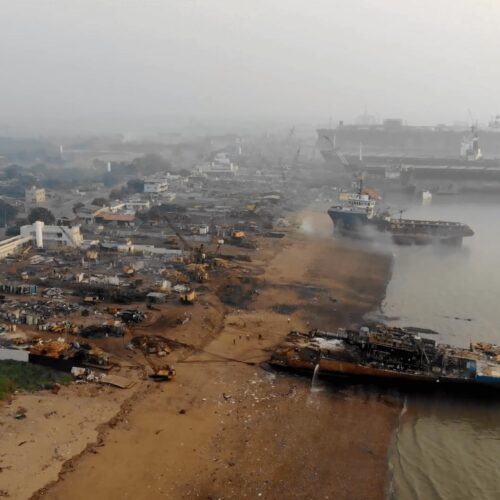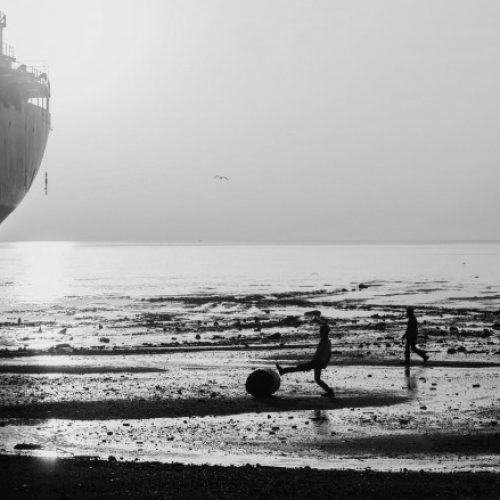Press Release – NGOs release new report on North Sea oil and gas recycling
The NGO Shipbreaking Platform released today a research report titled “Recycling Outlook: Decommissioning of North Sea Floating Oil & Gas Units” during a seminar held in Oslo, Norway.
With the oil and gas sector seeing a downturn since 2014, the Platform has documented an increasing number of offshore units sold for scrap. While the recycling of fixed installations occurs under strict regulations, there are serious concerns regarding the recycling of floating structures, which classify as vessels. Around 200 floating structures have been identified as scrapped globally since 2015 – an estimated 40% of these assets ended up on South Asian beaches, where they were broken up under conditions that cause irreparable damage to the coastal environment and put workers’ lives and health at risk.
Numerous floating platforms and oil and gas structures can be found in the North Sea, where the global oversupply in the rig-market is pushing the oldest assets to be scrapped. There are currently 59 floating mobile drilling rigs in the North Sea, 18 of which were built before 2001. Whilst some of the older units might be converted/upgraded, it is estimated that most of them will be scrapped in the coming years. So far, the only structure which operated in the North Sea and has been traced to a South Asian beaching yard is the FPSO North Sea Producer. There is a real risk, however, that we will see more of these cases coming up in the near future with more decommissioning projects in the North Sea.
The NGO Shipbreaking Platform advocates for the use of green recycling capacity already existing in the region. Indeed, North Sea recycling yards have years of experience decommissioning fixed oil and gas structures. There are several dry docks and contained slipway facilities where the dismantling of floating structures can take place safely and with due regard for labour and environmental concerns. Ehancing the recycling of offshore structures and ships in Europe would furthermore bring opportunities for the many workers that were laid off after the recession in the oil and gas sector in 2014.
The report was published with the support of Norwegian pension fund KLP. KLP promotes, as an essential part of its responsibility, practices of corporate responsibility and responsible investment. As a large investor in Norwegian companies, and companies based outside of Norway operating in the North Sea, it strives to ensure the responsible recycling of ships and offshore assets, aiming at contributing to a shift towards better practices in the sector.
Related news

Press Release – Bangladesh: ship explosion exposes regulatory failures
Deadly accident in a yard with Hong Kong Convention certification claims six lives.
... Read More
Platform News – Latest report on ship recycling in Turkey presented in Izmir
Attending the event, representatives from local NGOs, unions and concerned citizens engaged in a constructive dialogue.
... Read More
Press Release – One year later and no lessons learned at gadani as Aces is set aflame – again!
Shipbreaking plot no. 54 in Gadani, Pakistan, was sealed off yesterday after a massive fire broke out on-board the ship ACES (IMO 8021830). This is the same… Read More

Press Release – Two fatal accidents at Indian yards under EU scrutiny
Two separate accidents took place at well-known scrapping yards that have applied to be included in the EU list of approved ship recycling facilities.
... Read More
Press Release – Another worker dies at Alang shipbreaking yard
Just weeks before the Hong Kong Convention (HKC) for the Safe and Environmentally Sound Recycling of Ships is set to enter into force on 26 June,… Read More

Platform News – Maersk maintains beaching mantra and chooses to ignore facts revealed by Danwatch
After investigative journalists have revealed the severe short-comings of Maersk’s shipbreaking practices in Alang, India, the shipping giant blatantly disregards the findings. In an official statement, Maersk… Read More

Press Release – Worst corporate dumpers asked to clean up their acts
Targeting sustainability and fleet managers, the NGO Shipbreaking Platform calls for the adoption of responsible ship recycling policies in letters sent to shipping companies standing out for… Read More

Press Release – Maersk end-of-life vessels to hit the beaches again. NGOs denounce container ship company’s step back to boost profits
The NGO Shipbreaking Platform and Transport and Environment (T&E) denounce Maersk Group’s decision to beach their end-of-life vessels in India [1]. The world’s leading container ship owner… Read More






